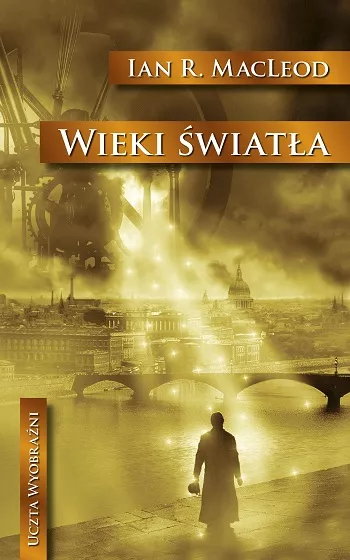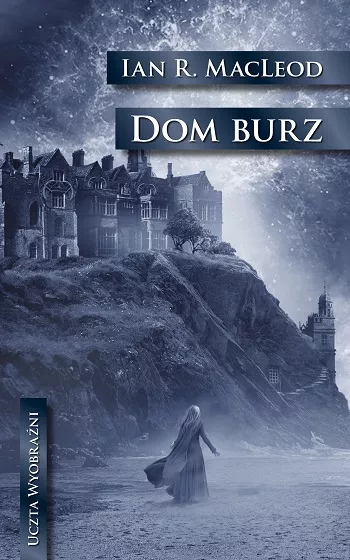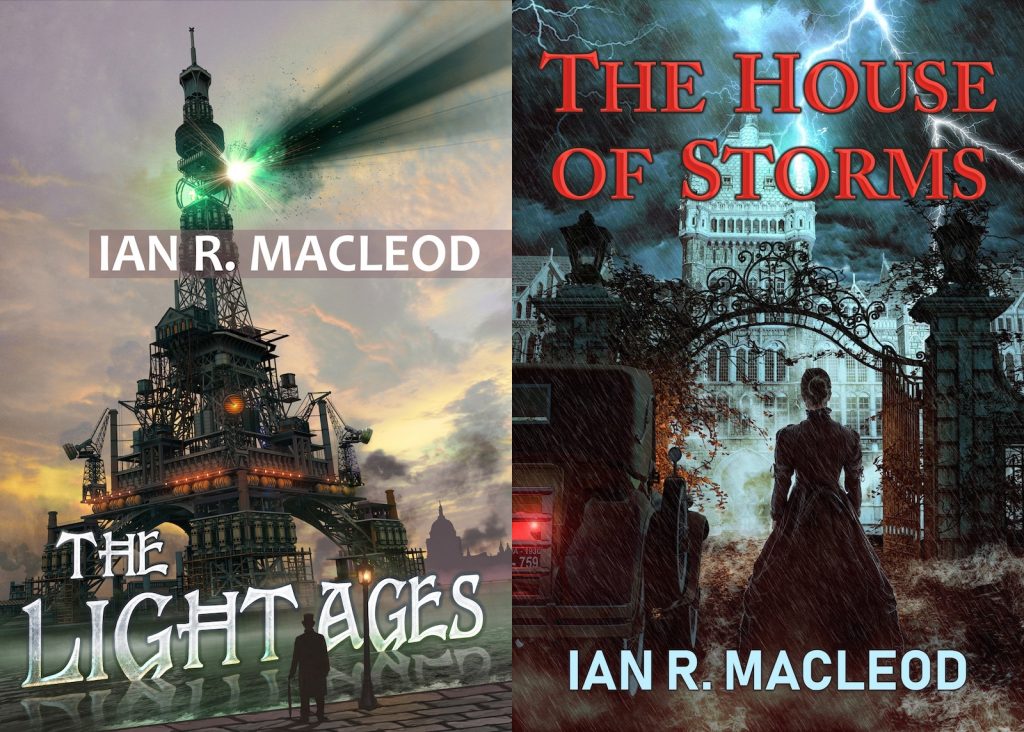
We’re very happy to announce that Ian R. MacLeod‘s acclaimed Aether Universe novels are available in Poland! Both novels — THE LIGHT AGES and THE HOUSE OF STORMS — are published by MAG, and out now. Read on for mored details.
THE LIGHT AGES (2003), the first novel in the series, was nominated for the World Fantasy Award, and was in third place for the Locus Award for Best Fantasy Novel. It is published in Poland as WIEKI ŚWIATŁA (cover above)…
Najwybitniejsze dzieło nowego nurtu New Weird. Powieść inspirowana m.in. „Klubem Pickwicka” rozgrywa się w XIX w. w industrialnej Anglii w środowisku lewicowego proletariatu.
Ian MacLeod w „Wieku Światła” pokazuje wpływ magii na rewolucję industrialną i na proces demokratyzacji systemu władzy. Tylko, że MacLeod odrzuca wszystkie ograniczenia konwencji gatunku i sprowadza swoją magię do postaci eteru – kopaliny wydobywanej z ziemi jak kolejny surowiec naturalny. Wszelkie mechanizmy zmian społeczno-ekonomiczno-politycznych poddane są wpływom wynikającym z posiadania, i nie-posiadania tego surowca. System załamuje się gdy złoża się wyczerpują i na moment znowu podlega prawom Historii, aż do odkrycia nowych źródeł eteru. Magia powraca i wszystko ponownie zamiera.
THE LIGHT AGES is published in the UK and North America by JABberwocky. Here’s the English-language synopsis…
Aether is industry, industry is magic and the Great Guilds rule the known world.
Raised amid the smokestacks, terraced houses and endless subterranean pounding of the aether engines of the Yorkshire town of Bracebridge, Robert Borrows is nevertheless convinced that life holds a greater destiny than merely working endless shifts for one of the Lesser Guilds. Then, on a day out with his mother to the strange gardens and weirdly encrusted towers of a remote mansion, he encounters a wizened changeling, and the young girl in her charge called Anna, and glimpses a world of wonder, mystery and surprise.
From then on, as he flees to London in the hope of escape and advancement, and explores its wide streets and dark alleys, and all the tiers of society from the lowest to the highest, he comes to realize that he holds the keys to secrets far bigger than even he imagined.

THE HOUSE OF STORMS, first published in 2005, is called DOM BURZ in Polish. Here’s the synopsis…
Mamy dziewięćdziesiąty dziewiąty rok Wieku Światła. Alice Meynell, wykorzystując wszystkie talenty pięknej kobiety oraz parę innych, bardziej tajemniczych, wywalczyła sobie tytuł arcycechmistrzyni Cechu Telegrafistów. Czyniła to wszystko z myślą o własnym rodzie – jednak jej jedyny syn, Ralph, od dzieciństwa cierpi na suchoty. Nie potrafią ich wyleczyć żadne znane w Europie lekarstwa, zaklęcia ani zabiegi.
W desperacji zawozi go do Invercombe na zachodnim wybrzeżu Anglii. Ma nadzieję, że Ralphowi pomoże ruch i czyste morskie powietrze. Lecz naprawdę pokłada mroczniejszą nadzieję w leżącej nieopodal, na odludziu, znanej niewielu krainie odmieńców: Einfell. Mieszka tam człowiek, który niegdyś ją kochał; teraz potwornie odmieniony przez magię. Alice odwiedza go i dobija targu o życie syna.
The second book in the series was also a contender for the Locus Award for Best Fantasy Novel. Also available in the UK and North America via JABberwocky, here’s the English-language synopsis…
In the ninety-ninth year of the Age of Light, Alice Meynell has fought her way up to Greatgrandmistress of the Guild of Telegraphers, and is determined not to let even the consumption which is ravaging her son stand in the way. What follows, through a long, hot summer in the great house of Invercombe overlooking the Bristol Channel, changes not only their lives but those of everyone in England, and perhaps the whole known world.
The House of Storms follows on from double World Fantasy Award-winner Ian R MacLeod’s The Light Ages in creating a vividly three-dimensional vision of a landscape and a society both very like, but also wonderfully different from, our own. Part fantasy and part history, and filled with compelling characters and a deep sense of place, the story he tells is uniquely powerful and strange.

Here, too, is a selection of reviews the series has received…
‘… this beautifully written, complex fantasy novel… With its strong character development and gritty, alternate London, this book won’t attract fans of Robert Jordan or Terry Goodkind, but should hold great appeal to readers who love the more sophisticated fantasy of Michael Swanwick, John Crowley or even China Miéville.’ — Publishers Weekly (Starred Review) on THE LIGHT AGES
‘MacLeod’s triumphs come in various ways. First of all is the depth and consistency and physicality of his creation. The 300-year-old world of aetherish England is palpably real, encrusted with hoary traditions, ancient legends (the tale of a redeemer figure known as Goldenwhite is particularly significant, for Anna’s career will parallel Goldenwhite’s) and odd customs. Yet strange and beautiful and resonant as all these counterfactual adornments are, they are perfectly balanced by the things in common with our world: social climbing, Oedipal longings, the allure of the big city for the rural youth. In other words, MacLeod has succeed in fusing Great Expectations (1861) or Look Homeward, Angel (1929) with Peake’s exoticism, producing a book that is at once real literature and real fantasy, betraying neither tradition.’ — SciFi.com on THE LIGHT AGES
‘MacLeod’s descriptive powers are so effective that you can visualize every detail… [He] skillfully incorporates literary influences ranging from William Blake to Dickens to 1984 and the working class novels of the 1950s—and arrives at something original. Magical, visionary and enthralling, THE LIGHT AGES is award-winning stuff.’ — SFX
‘Totally convincing and vividly written, this book invests the dark streets of London with a magic the reader will never forget… a brilliant writer.’ — Tim Powers on THE LIGHT AGES
‘… Ian R MacLeod, a seasoned, gritty writer with a great depth of knowledge and understanding, who could teach us all a thing or two about writing a damn good tale… characters are well developed and interesting and, more importantly, highly believable and real. To me it was JG Ballard meets Robert Fripp. Intelligent and yet not pretentious, well written but not academic… It is a plot that is like a journey on British Rail – fraught with perils and dangers, but eventually getting you there… The House of Storms will not win prizes because no prize could do it justice… It is a monumental work of science fiction far superior to Asimov. MacLeod is set to become a writer of the magnitude of Dickens or Tolkien, yet I fear his work will not be truly appreciated for a generation to come.’ — Guardian on THE HOUSE OF STORMS
‘Ian MacLeod writes like an angel. It’s as simple as that. He strings together ideally chosen words into sentences that are variously lush, sparse, subtle, bold, joyous, mournful, comic or tragic. These sentences mount into perfectly balanced paragraphs, which in turn assemble themselves into poised and dramatically organic chapters. The reader is carried along effortlessly on the flow of MacLeod’s prose, internalizing his vision as if in a dream.’ — SciFi.com on THE HOUSE OF STORMS
‘MacLeod’s ability to tell a tale that blends history-in-the-making with the stories of men and women who make that history renders this chronicle of love, war, and human aspiration a strong addition to any fantasy collection.’ — Library Journal on THE HOUSE OF STORMS
‘In the end, as compelling as the plot may be, readers will find themselves slowing down, holding back, turning the pages with deliberate care. For the world MacLeod creates, the characters who live there, the schemes and terrors they find themselves involved in are so real, so beautifully rendered, that readers will not want to leave them behind.’ — Interzone on THE HOUSE OF STORMS
